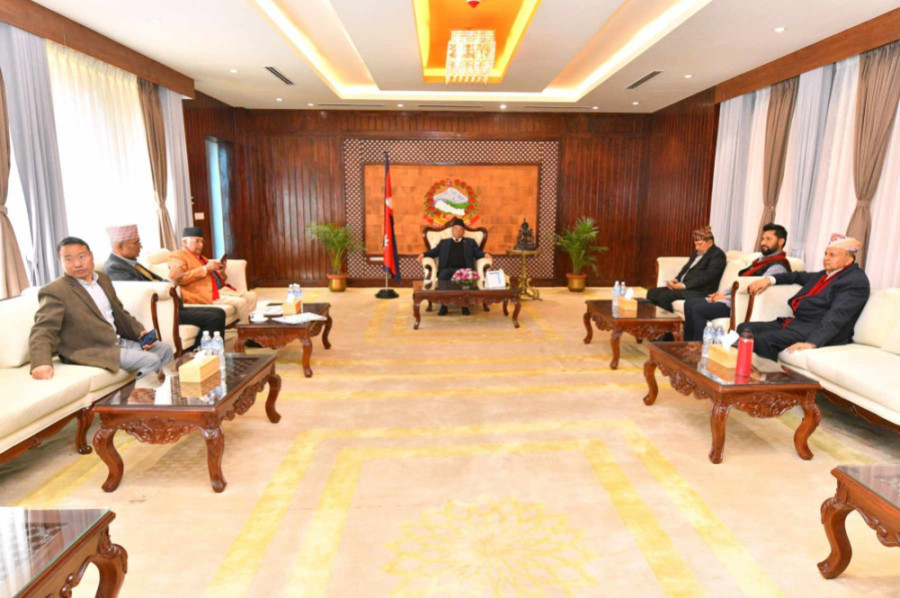Politics
Provinces will get new governments, leaders of five-party coalition say
New alliance of UML and Maoists with other parties, however, lacks numbers to oust all Congress-led Cabinets.
Post Report
CPN-UML General Secretary Shankar Pokharel has said that the process of changing the leadership of the provincial governments will start this week as per an agreement in the ruling alliance.
Addressing a party event in the Capital on Tuesday, Pokharel said that changes in provincial governments in line with the federal governing coalition are natural. A new ruling alliance was formed in Kathmandu on March 4, with Prime Minister and CPN (Maoist Centre) Chairman Pushpa Kamal Dahal joining hands with the CPN-UML by breaking an over-a-year-long alliance with the Nepali Congress.
The five-party alliance is now working for changes in the provincial governments, mainly those led by the Congress. “We are working to form the provincial governments in line with the new alliance in Kathmandu,” Pokharel said.
The ruling parties have a broader understanding on dividing the chief ministerial positions of the seven provinces among four parties. The senior partner—UML—will govern Koshi, Gandaki and Karnali provinces, while the Maoist Centre will command the governments in Bagmati and Lumbini provinces. Likewise, the Janata Samajbadi Party will continue to rule in Madhesh, and the Nagarik Unmukti Party will lead the Sudurpaschim provincial Cabinet.
Currently, the Congress leads the government in four provinces—Sudur Paschim, Lumbini, Gandaki and Koshi.
As per the agreement, the leadership of the two provinces led by the Congress will come to the UML while the Maoist Centre and the Nagarik Unmukti Party will lead a provincial government each. The Moaist Centre will hand over the command of Karnali to the UML. However, a section of the party is against doing so.
But the five-party alliance doesn't command a majority in some of the provinces.
The ruling alliance is having trouble retaining Shalikram Jamkattel, a Maoist leader, as the chief minister of Bagmati.
Jamakattel commands 55 provincial assembly members, including 27 from the UML, seven from the CPN (Unified Socialist), and 21 from his party.
He is short of one vote to reach the magic number of 56 in the 110-strong provincial assembly. The ruling alliance is reaching out to the Nepal Majdoor Kisan Party and the Hamro Nepali Party that have three and two seats, respectively, for support.
“We are in talks with both the parties to muster a majority,” said Saral Sahayatri Poudel, a provincial assembly member who leads the Maoist party in Bagmati Province.
Similar is the position of the new alliance in Gandaki. It needs the support of 31 members in the 60-strong provincial assembly. The UML has 22 and the Maoist Centre has eight including the Speaker. It will need the support of two additional members. The Rastriya Prajatantra Party has two members.
The Surendra Pandey-led Congress government is making every effort to prolong its tenure.
In Sudurpaschim Province, Chief Minister Kamal Bahadur Shah expanded his Cabinet twice within three days last week in an effort to save his seat. He inducted four ministers from the Nagarik Unmukti Party, amid a dispute in the force formed by Resham Lal Chaudhary. Shah’s coalition relies on the Nagarik Unmukti Party, Rastriya Prajatantra Party and an independent member of the assembly.
As the new alliance has agreed to support the Nagarik Unmukti Party, it will withdraw its support to the Shah government.
The Maoist Centre has called a secretariat meeting on Wednesday to form its position on sharing the leadership of the provinces. The meeting will decide on the matter as well as on the selection of candidates for the bypolls due next month, said party secretary Devendra Poudel.




 14.24°C Kathmandu
14.24°C Kathmandu













